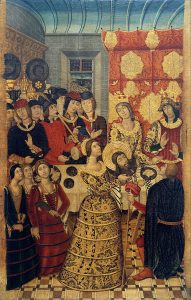Thoughts on Sunday’s Lessons for July 11, 2021
First Reading (Track One): 2 Samuel 6:1-5, 12b-19
King David, who now reigns over the two kingdoms of Israel and Judah, celebrates as the Ark of the Covenant, which had been in the hands of the Philistines, arrives in Jerusalem.

Herod’s Banquet (c.1470), tempera painting on wood with stucco reliefs and gold leaf by Pedro García de Benabarre (1445-1485). Museu Nacional d’Art de Catalunya, Barcelona. (Click image to enlarge.)
This portable shrine, which the people had built in the desert as a holy throne for God, stood at the heart of Israel’s worship. Its arrival was met with great celebration, music and dancing; David himself leaped and danced with all his might. In one curious verse, though, we discover that Saul’s wife, Michal, saw him dancing and “despised him in her heart.” What was that about? Later verses suggest that Michal didn’t think that David was decently dressed during his dance in front of all the people of Israel.
First Reading (Track Two): Amos 7:7-15
Amos never expected to be a prophet. He was a humble herder and tender of sycamore trees. But he heeded God’s call to tell the people of Israel to expect destruction because God had measured them and found them wanting. When Amos warned King Amaziah to expect destruction and exile, the angry King told Amos to get out of his sight, to go back where he came from. Amos learned, as did John the Baptist some six centuries later (as we hear in this week’s Gospel), that prophecy can be dangerous and can get a person killed. Nevertheless, both prophets heard God’s call and did not refuse to answer it.
Psalm (Track One): Psalm 24
Bible scholars find hints of ancient liturgy in this Psalm. Thought to be a hymn to be sung in procession toward the Temple, it rhetorically asks how one earns the right to come in and worship. The priest calls out, “who shall stand in his holy place?” The crowd roars back, “Those who have clean hands and pure hearts!” “Who is the king of glory?” “The Lord of hosts!” All who come to the Temple with clean hands and pure hearts can count on the protection of God, the King of Glory.
Psalm (Track Two): Psalm 85:8-13
This beautiful Psalm segment gives us a moment of peace between the anger in Amos in the first reading and the violence of John the Baptist’s death in the Gospel. When God speaks, the faithful people hear peace. Heaven and earth meet in truth and righteousness; righteousness and peace share a tender kiss. God grants prosperity and a fruitful harvest, and all manner of things shall be well.
Second Reading: Ephesians 1:3-14
Our second readings for the next six Sundays will be taken from the letter to the Ephesians, a letter most likely written by a later follower of Paul around the end of the first century. The Christian community in Ephesus was facing persecution. Many of its leaders were struggling to fit in to popular culture, and Ephesians may reflect that, as its pages include some difficult passages (which we won’t hear in our readings) that urge wives to submit to their husbands and slaves to obey their owners. In today’s reading, though, Paul’s concept of grace as God’s free gift through Jesus remains at the center. We also see hints of an evolving theology of Christ being present with God before the creation of the Earth.
Gospel: Mark 6:14-29
It did not take evil King Herod long to learn about the healings and miracles that Jesus and his apostles were performing in Galilee, and he was very likely both angry and afraid. Herod may have been troubled by a guilty conscience, as he had just had John the Baptist beheaded – at the insistence of his new wife and her daughter – and Herod wasn’t happy about that. Now that rumors are swirling about Jesus and his activity in Galilee, people are wondering if Jesus is John, brought back to life, and Herod wonders about that, too: “John, whom I beheaded, has been raised.”
